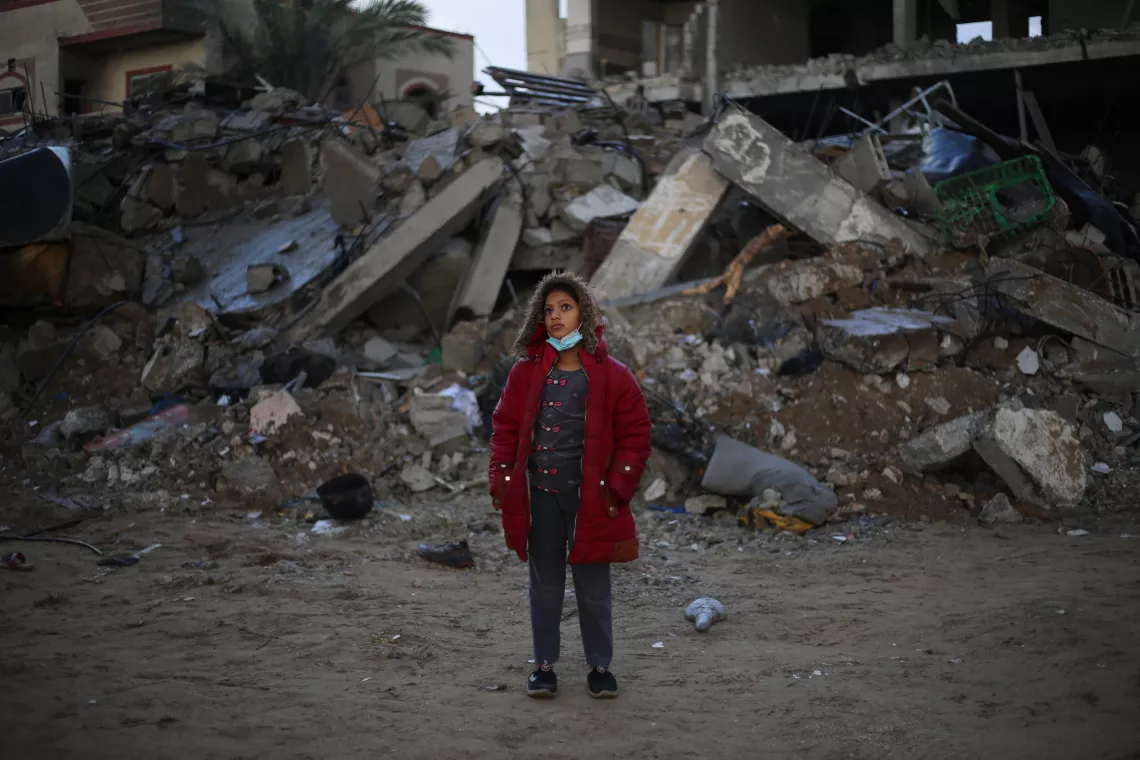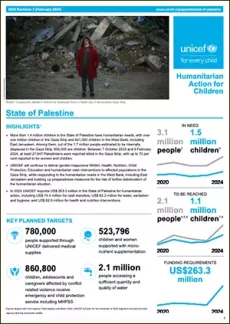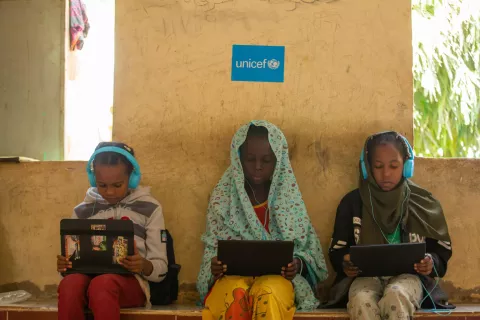State of Palestine Appeal
Humanitarian Action for Children
UNICEF’s Humanitarian Action for Children appeal helps support the agency’s work as it provides conflict- and disaster-affected children with access to water, sanitation, nutrition, education, health and protection services. Return to main appeal page.
State of Palestine snapshot
Appeal highlights
- More than 1.4 million children in the State of Palestine have humanitarian needs, with over one million children in the Gaza Strip and 421,000 children in the West Bank, including East Jerusalem. Among them, out of the 1.7 million people estimated to be internally displaced in the Gaza Strip, 850,000 are children. Between 7 October 2023 and 9 February 2024, at least 27,947 Palestinians were reported killed in the Gaza Strip, with up to 70 per cent reported to be women and children.
- UNICEF will continue to deliver gender-responsive WASH, Health, Nutrition, Child Protection, Education and humanitarian cash interventions to affected populations in the Gaza Strip, while responding to the humanitarian needs in the West Bank, including East Jerusalem and building up preparedness measures for the risk of further deterioration of the humanitarian situation.
- In 2024 UNICEF requires US$ 263.3 million in the State of Palestine for humanitarian action, including US$ 74.4 million for cash transfers; US$ 62.2 million for water, sanitation and hygiene; and US$ 62.9 million for health and nutrition interventions.

Key planned results for 2024
780,000 people supported through UNICEF delivered medical supplies
523,796 children and women supported with micro-nutrient supplementation
860,800 children, adolescents and caregivers affected by conflict related violence receive emergency and child protection service including MHPSS
2.1 million people accessing a sufficient quantity and quality of water
Funding requirements for 2024
Country needs and strategy
 Humanitarian needs
Humanitarian needs
It is estimated that over three million people require humanitarian assistance in the State of Palestine (2.2 million Gaza Strip; 900,000 West Bank, including East Jerusalem). As a result of 7 October event in Israel and the escalation of the conflict, children in the Gaza Strip are facing the 'triple threat’ of conflict, disease, and malnutrition. As of 9 February, at least 27,947 Palestinians were reported killed since hostilities began, with up to 70 per cent reported to be women and children. More than 67,459 Palestinians were reported injured, including at least 11,482 children. Israeli sources report at least 35 Israeli and foreign national children killed, with at least 36 children abducted from Israel into the Gaza Strip, of whom 34 were released. As of 23 January 2024, there were estimated to be over 1.7 million internally displaced people, 50 per cent being children in the Gaza Strip. Displaced children are enduring challenging living conditions in overcrowded shelters and informal sites with limited availability of safe water, putting them at risk of epidemics and preventable diseases. Girls in particular face additional risks including the lack of privacy and safety concerns impacting their dignity and mobility as well as mental and physical health. Thousands of children are estimated to be unaccompanied and separated from their families. As a result of the conflict, the number of children with disabilities has increased and specialized care and services are no longer available. As of 7 February, there were no fully functional hospitals in the Gaza Strip, with 36 per cent of hospitals only partially functional.
The Integrated Food Security Phase Classification (IPC) concluded in December 2023 indicates that the entire population in the Gaza Strip was classified in IPC Phase 3 or above (crisis or worse). Up to 1.2 million people are experiencing emergency levels of acute food insecurity. As the risk of famine conditions continues to increase, all children under five – an estimated 335,000 children – are at high risk of severe malnutrition and preventable death.
In the occupied West Bank, including East Jerusalem, at least 100 Palestinian children were reported killed in conflict-related violence between 7 October 2023 and 9 February 2024. Militarized law enforcement operations inside Palestinian communities and camps involving high use of live ammunition, explosive weapons, and aerial strikes, as well as settler violence, demolitions, and movement restrictions, have put Palestinian children at higher risk of violence, grave violations, and displacement, and impact their access to services.
 UNICEF’s strategy
UNICEF’s strategy
Despite the extremely challenging context, UNICEF is committed to continue to deliver gender-responsive humanitarian WASH, health, nutrition, child protection, education and cash for basic needs programming at scale. Strategic priorities include a multi-sectoral nutrition response to prevent, protect, early detect, and treat children with wasting. In the WASH sector, UNICEF will sustain the production and delivery of water in the southern Gaza Strip while expanding water provision in northern governorates, and for vulnerable people across the Strip and expanding the provision of sanitation and hygiene items to most vulnerable displaced households. UNICEF is scaling up child protection interventions through the provision of mental health and psychosocial support (MHPSS) and scaling up identification, documentation, tracing and reunification of unaccompanied and separated children (UASC). UNICEF is providing winter clothes and blankets for most vulnerable children. Alongside support to sustain essential healthcare provision to prevent childhood diseases, UNICEF is expanding the delivery of immunization services within the Strip. As children are missing out on education, and teachers and children have lost teaching and learning materials, UNICEF is scaling up learning activities through temporary learning opportunities. Multi-purpose cash assistance will be provided to most vulnerable households addressing their basic needs, and cash top-ups will benefit pregnant and breastfeeding women (PBW) and children with disabilities (CWD). Incentive-based cash will support solid waste management around displacement locations. Alongside the World Bank, the EU, and UN, UNICEF will support the Rapid Damage Needs Assessment upon a ceasefire for the reconstruction of education, health and WASH infrastructure.
Across the West Bank, including East Jerusalem, UNICEF is scaling up preparedness measures for a potential deterioration in humanitarian conditions. Immediate response priorities include supporting vulnerable children with conflict-related injuries and MHPSS needs, online education, provision of water at community level and medical supplies to health facilities.
UNICEF is partnering with women-led and girls-centered organizations, and organizations of persons with disabilities. UNICEF is strengthening support to PBW and CWD including prioritizing supplies tailored to women, girls and CWD; gender-based violence risk mitigation; and improving access to resources, services and information for marginalized groups. UNICEF will procure assistive technology for CWD and a humanitarian package specifically for adolescent girls.
Social and behavioral change strategies underpin these comprehensive strategies, ensuring that delivering humanitarian assistance in WASH, health, nutrition, child protection, education, and cash is effective, and contributing to positive and sustainable changes within communities across the State of Palestine.
UNICEF leads the coordination of the WASH and Nutrition Clusters, while co-leads the Education Cluster and leading the Child Protection Area of Responsibility, including the Technical Working Group on UASC. UNICEF also supports the Inter-Agency Prevention of Sexual Exploitation and Abuse network.
Programme targets
Find out more about UNICEF's work
Highlights
Humanitarian Action is at the core of UNICEF’s mandate to realize the rights of every child. This edition of Humanitarian Action for Children – UNICEF’s annual humanitarian fundraising appeal – describes the ongoing crises affecting children in the State of Palestine; the strategies that we are using to respond to these situations; and the donor support that is essential in this response.



